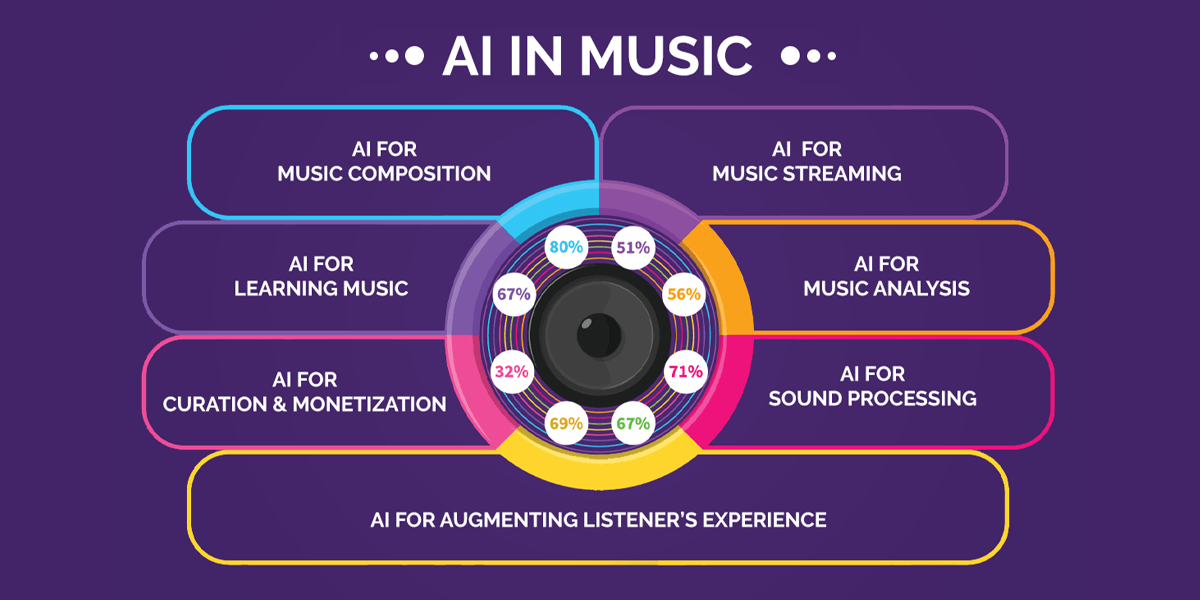Introduction
Music has been a timeless expression of human creativity and emotion. From classical symphonies to modern pop hits, the process of composing music has always been deeply rooted in human artistry and inspiration. However, the digital age has ushered in a new player in the world of music composition: artificial intelligence (AI). In this blog post, we’ll explore how AI is making its mark on music composition, from algorithms that generate melodies to AI-produced hit songs.
The Marriage of AI and Music
At first glance, the notion of AI composing music may seem strange or even sacrilegious to some music purists. After all, music has always been considered a uniquely human form of expression. But AI’s foray into music composition is not about replacing human creativity; it’s about enhancing and expanding it in ways we never thought possible.
Here’s how AI is revolutionizing the music composition process:
Algorithmic Composition: AI algorithms are capable of generating melodies, harmonies, and chord progressions. These algorithms analyze vast amounts of existing music to identify patterns and create original compositions based on those patterns.
Enhancing Creativity: AI can serve as a collaborator, providing musicians with new ideas and inspiration. It can suggest chord changes, melodies, or even instrument choices that a human composer might not have considered.
Efficiency: AI can compose music much faster than humans. This efficiency is especially valuable for composers working on tight deadlines, such as film or video game composers.
Personalization: AI can generate music tailored to individual preferences. For example, streaming platforms use AI to create personalized playlists based on users’ listening habits.
The Rise of AI-Generated Music
AI-generated music is no longer a futuristic concept; it’s a reality that’s gaining traction across the music industry. Here are some notable developments in the world of AI-generated music:
Jukedeck: Jukedeck was one of the pioneers in AI music composition. The platform allowed users to create custom music tracks for videos, advertisements, and more by selecting genres, moods, and other parameters. It was eventually acquired by TikTok.
Amper Music: Amper Music offers a platform that enables users to compose original music using AI. Musicians and content creators can leverage Amper’s technology to quickly generate background music and soundtracks.
AI-Produced Pop Songs: In 2017, an AI program named “Flow Machines” composed a pop song titled “Daddy’s Car,” which sounded like it came straight from the ’60s. The program analyzed a database of songs from that era to create an authentic retro feel.
AI-Generated Albums: Some artists are experimenting with AI-generated music on a larger scale. Taryn Southern released an entire album, “I AM AI,” composed with the assistance of AI algorithms. The album featured songs with catchy melodies and lyrics written by Taryn herself.
Challenges and Controversies
While AI in music composition offers exciting possibilities, it also raises several challenges and controversies:
Lack of Emotional Depth: Critics argue that AI-generated music lacks the emotional depth and nuance that human composers infuse into their work.
Copyright and Ownership: Determining the ownership of AI-generated music can be complex. Is the creator the human who trained the AI, the AI itself, or a combination of both?
Creativity vs. Replication: Some question whether AI truly creates music or merely replicates existing styles and patterns.
Unpredictability: AI algorithms can sometimes produce unpredictable and unconventional compositions, which may not always align with human preferences.
The Future of AI in Music Composition
Despite the challenges and controversies, the future of AI in music composition looks promising. Here are some exciting possibilities:
Enhancing Collaboration: Musicians may increasingly collaborate with AI systems, using them as creative partners to explore new musical territories.
Customization: AI could create personalized music experiences, where listeners receive music tailored to their unique preferences and moods.
Music Education: AI can assist music educators and students by providing composition assistance and generating practice materials.
Exploring New Genres: AI can push the boundaries of music by creating entirely new genres and styles that humans may not have envisioned.
Closing Notes
AI is undeniably reshaping the landscape of music composition. It’s not about replacing human creativity but expanding it, offering new tools and possibilities to musicians and composers. As we continue to explore the synergy between AI and music, we can anticipate a future where the boundaries of musical expression are stretched further than ever before, giving rise to compositions that blend the best of human and machine creativity.
AI’s role in music composition is akin to a symphony conductor, guiding human creativity to new heights. From generating melodies to creating hit songs, it’s not about who’s composing but how the symphony of collaboration between humans and machines produces music that transcends imagination.





